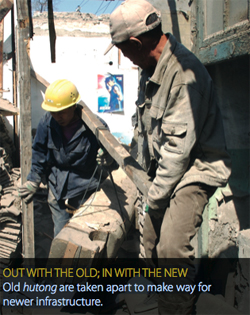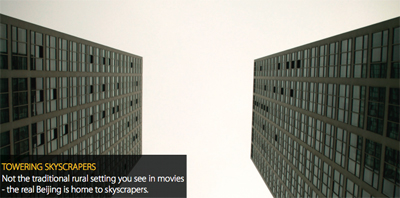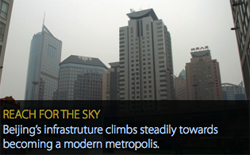 Brian Lim, who visited Beijing in April on a study trip, discovers that China’s capital has been transformed from a backward place to a sprawling metropolis with the advent of the Beijing Olympics 2008.
Brian Lim, who visited Beijing in April on a study trip, discovers that China’s capital has been transformed from a backward place to a sprawling metropolis with the advent of the Beijing Olympics 2008.
It was my first time stepping into China and I expected Beijing to be a place of rich cultural and historical significance as it served as China’s capital since the Ming and Qing dynasties. The April chill greeted us, four lecturers and 40 students from the Ngee Ann Polytechnic School of Film & Media Studies, as we embarked on a study trip to produce a coffee-table book, a Chinese Opera website and several documentaries.
But as the plane touched down on the tarmac, I was struck by the new Terminal 3 of the Beijing Capital International Airport. It is a structure of astounding proportions, a sleek creation of glass, steel and aluminium, with skylights riding along the spine; all details that are vaguely reminiscent of a Chinese dragon.
The grandeur of Terminal 3 mirrors that of the famous Forbidden City, as its design and decoration features many traditional Chinese elements. Even the giant copper vats we saw in the Forbidden City used to store water for fire fighting made an appearance in the terminal.
Sir Norman Foster, a renowned British architect, specially designed it to handle the expected traffic for the upcoming Beijing Olympic Games in August. It is China’s gargantuan gateway to the rest of the world, and it marks the start of a new era for China.
That was our entrance into Beijing as we stepped through customs (where we’re now pointed to the “Foreigners” queue, not “Aliens”). On the way to the hotel, we had our first look at Beijing. If we were expecting rickety rickshaws and dull buildings, we were sorely disappointed.
The capital is dotted with signs of a mega plan to give the city a new look. Old buildings are taken apart to make way for newer ones. In Wangfujing, a popular place for shoppers where we spent a few hundred (some even a few thousand) yuan, construction sites are promising signs of even more merchandise.
Their transport systems have also been upgraded. Since 2004, another Ring Road (their sixth so far) was added, together with a batch of major expressways to facilitate traffic movement during the Olympics. Three more subway lines are set to open by August, making it a total number of eight subway lines.
And while the Great Wall of China is a famous attraction (we visited the Badaling section, within the municipality of Beijing) winding 4.8km over rolling mountains, the subways were an equally impressive construction as 142km of tracks snake beneath the city.
Much to my amusement, I found that even people who have lived in Beijing for over two years have to consult maps. Their transport system is simply too big to navigate from memory! Our routes had to be planned before we stepped out of the hotel or we ran the risk of being lost (which is not a funny thing when you’re in Beijing).
There are other changes tourists will surely appreciate – the toilets are generally cleaner, smoking has been banned in most public places and the signs in English are less “humourous” (“No Speaking Handphones on the Great Wall” made many of us chuckle).
Perhaps the most enthralling thing about Beijing is the blend of old and new. Whether you’re looking for the cultural or the contemporary, there’s something to appreciate. Even with the economic burst and rapid expansion Beijing retains much of its old charm, and it’s evident in almost every facet of the city. Hou Hai, primarily a nightlife district, is an attraction for many local youths. There are so many pubs and bars to choose from that we were spoilt for choice. But within the same district, traditional hutong are open for public tours.
And the many cinemas that bring in blockbuster hits are a sharp contrast to the more traditional places of entertainment – Beijing has a number of theatres dedicated to Chinese Opera, and a few of us had a taste of the various opera types (together with acrobats and magic) in Lao She Cha Guan, a famous teahouse where performances are held.
I came home with a new impression of Beijing as a place of intrigue. The Olympics has spurred China to put its best foot forward, and come the grand opening of the Games in August, the world will see its remarkable metamorphosis into a cosmopolitan metropolis.



